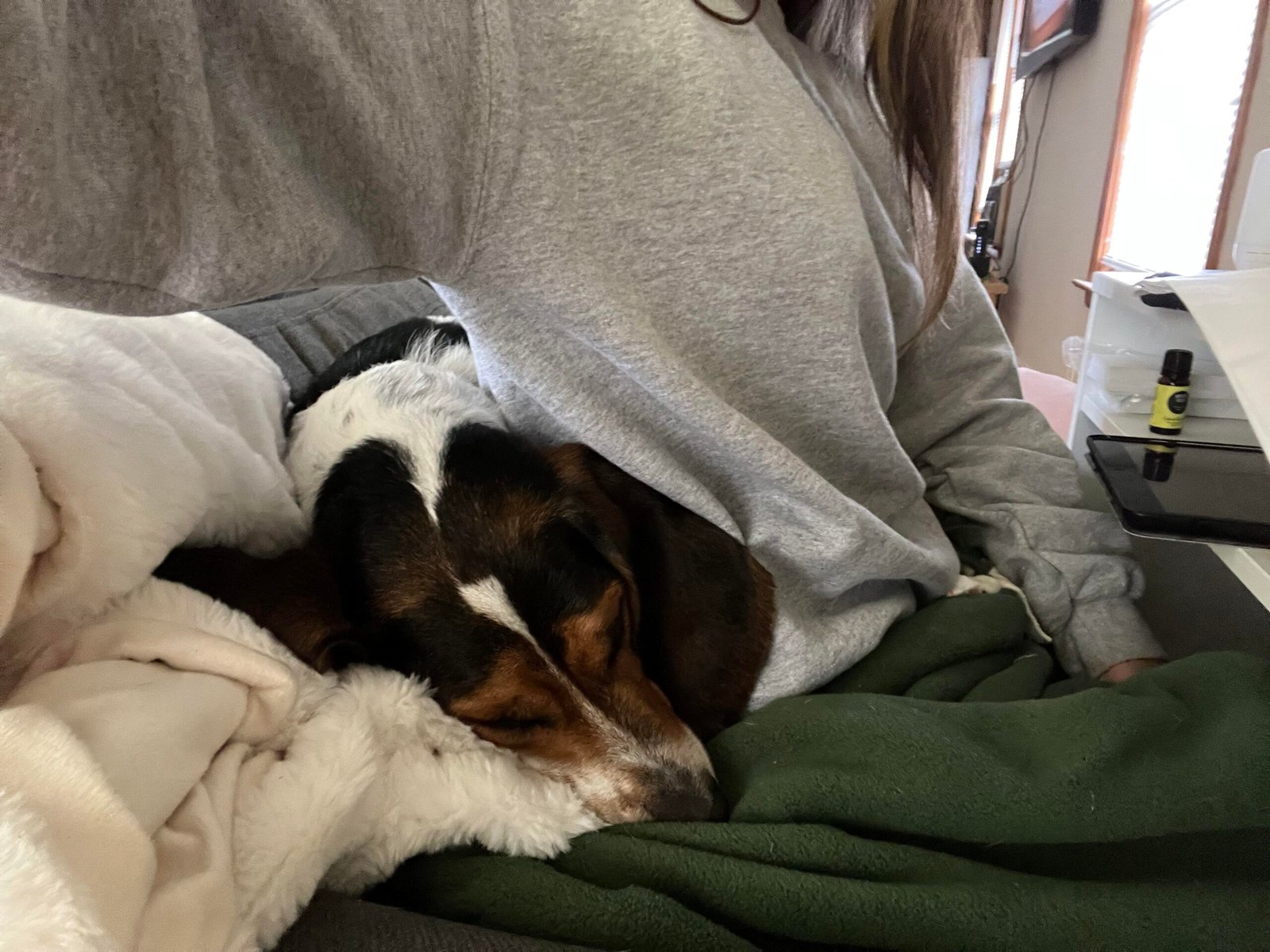It’s no secret that beagles are known for their friendly and social nature, but have you ever wondered why your beagle is so clingy? Whether it’s following you around the house or constantly seeking attention, there may be reasons behind their behavior that you might not be aware of.
Beagles are pack animals with a long history of working closely with humans, which could explain their clinginess. Throughout history, beagles have been used for hunting in packs, relying on their close bond with their human handlers. This history of dependence on human companionship has been passed down through generations, resulting in a breed that craves human interaction and companionship.
A beagle may become clingy due to various reasons. One possible reason is separation anxiety, where the dog exhibits clingy behavior to cope with the fear of being alone. Another reason could be lack of exercise or mental stimulation, causing the beagle to seek attention and companionship. It’s important to understand the underlying cause and address it accordingly through training, exercise, and enrichment activities to help alleviate clinginess.

Understanding Your Beagle’s Clingy Behavior
Beagles are known for their affectionate nature and strong attachment to their owners. However, if your beagle seems overly clingy, it may be a cause for concern. In this article, we will explore the reasons behind why your beagle may be displaying clingy behavior and what you can do to address it.
1. Separation Anxiety
One possible reason for your beagle’s clingy behavior is separation anxiety. Beagles are pack animals and thrive on the companionship of their family members. When they are left alone for long periods, they may experience anxiety and become clingy when you are present. Signs of separation anxiety include excessive barking, destructive behavior, and restlessness.
To help alleviate separation anxiety, gradually acclimate your beagle to being alone by leaving them for short periods and gradually increasing the duration. Provide them with toys or puzzles to keep them occupied and consider seeking professional help from a dog behaviorist if the issue persists.
2. Lack of Mental Stimulation
Another reason why your beagle may be clingy is a lack of mental stimulation. Beagles are intelligent dogs that require mental challenges to keep them engaged and prevent boredom. Without adequate mental stimulation, they may become clingy and seek constant attention.
Provide your beagle with interactive toys, puzzle games, and training sessions to keep their minds active. Engage them in activities that tap into their natural hunting instincts, such as scent work or puzzle toys with hidden treats. This will help redirect their attention and decrease their clinginess.
3. Health Issues
In some cases, clingy behavior in beagles can be a result of health issues. If your beagle’s clinginess is accompanied by other symptoms such as lethargy, loss of appetite, or changes in bathroom habits, it is important to consult with a veterinarian to rule out any underlying medical conditions.
Common health issues that can cause clingy behavior include pain, discomfort, or hormonal imbalances. Once the underlying health issue is addressed and treated, the clinginess should improve.
4. Lack of Exercise
Beagles are an active breed that requires regular exercise to maintain their physical and mental well-being. If your beagle is not getting enough exercise, they may become restless and bored, leading to clingy behavior.
Make sure to provide your beagle with daily exercise, such as walks, runs, or playtime in a securely fenced area. Engage them in activities that allow them to use their senses, such as sniffing games or agility training. Regular exercise will help burn off excess energy and reduce their clinginess.
5. Lack of Socialization
Socialization is crucial for beagles to develop into well-adjusted and confident dogs. If your beagle has not been exposed to different environments, people, and animals during their early development stages, they may become anxious and clingy in new situations.
Expose your beagle to various social experiences gradually and positively. Introduce them to different people, animals, sounds, and environments to build their confidence and reduce their clingy behavior. Enrolling them in a puppy socialization class or working with a professional dog trainer can also be beneficial.
6. Lack of Routine
Beagles thrive on routine and predictability. If your beagle does not have a consistent daily routine, they may become uncertain and seek constant reassurance and attention.
Establish a daily routine for your beagle that includes regular meal times, exercise, playtime, and rest. Stick to this routine as much as possible, as it provides your beagle with a sense of security and reduces their clingy behavior.
7. Reinforcing Clingy Behavior
It’s important to evaluate your own behavior and see if you may inadvertently be reinforcing your beagle’s clingy behavior. If you constantly give in to their demands for attention and affection when they are clingy, they learn that this behavior gets rewarded.
Instead, encourage independence by rewarding your beagle for calm and independent behavior. Teach them basic obedience commands such as “sit,” “stay,” and “settle,” and reinforce these behaviors with treats and praise. Gradually increase the distance and duration of time that your beagle spends independently, rewarding them for their progress.
8. Age and Personality
Lastly, it’s important to consider your beagle’s age and individual personality. Beagle puppies are naturally more dependent and may display clingy behavior as they navigate their new surroundings. With age and proper training, their clinginess should decrease.
Additionally, some beagles have a more velcro-like personality, meaning they naturally gravitate toward their owners and prefer to be in close proximity. This is just a part of their unique personality and should be embraced rather than discouraged.
Conclusion
Understanding why your beagle is clingy is the first step in addressing the behavior. By considering factors such as separation anxiety, lack of mental stimulation, health issues, exercise, socialization, routine, reinforcement, age, and personality, you can work towards helping your beagle become more independent and confident.
Common Reasons for Beagle Clinginess
- Separation anxiety
- Lack of mental stimulation
- Health issues
- Lack of exercise
- Lack of socialization
- Lack of routine
- Reinforcing clingy behavior
- Age and personality
Key Takeaways: Why is My Beagle So Clingy?
- Beagles are naturally affectionate and love being around their owners.
- Clinginess can be a sign of separation anxiety in Beagles.
- Inadequate exercise and mental stimulation can contribute to clinginess in Beagles.
- Beagles may become clingy due to a change in routine or environment.
- Positive reinforcement training can help manage clinginess in Beagles.
Frequently Asked Questions
Here are some common questions and answers about why beagles can be clingy:
1. Why does my beagle follow me everywhere?
Beagles have a strong pack instinct, and they see their human family as their pack. They are naturally social animals and enjoy the company of their favorite humans. If your beagle follows you everywhere, it means they feel safe and secure in your presence and want to be near you.
Additionally, beagles have a keen sense of smell, and they might be following your scent as they explore their surroundings. They are curious by nature and want to be involved in everything you do.
2. Is my beagle clingy because they are lonely?
Loneliness can contribute to clingy behavior in beagles. If they are not getting enough attention, mental stimulation, and social interaction, they may become more clingy and seek constant companionship. Beagles are sociable dogs that thrive on human interaction and can become anxious or bored if left alone for long periods.
It’s important to ensure your beagle has plenty of opportunities for exercise, playtime, and mental stimulation. Consider providing them with puzzle toys, interactive games, or even a second dog companion to help alleviate their loneliness and reduce clingy behavior.
3. Can separation anxiety cause clinginess in beagles?
Yes, separation anxiety can manifest as clingy behavior in beagles. Beagles are known to form strong bonds with their owners, and when they are separated, they may experience stress and anxiety. This can lead to clingy behavior when the owner is present, as the beagle may fear being left alone again.
If you suspect separation anxiety, it’s important to work with a professional dog trainer or behaviorist to address the issue. They can help you implement strategies to gradually reduce your beagle’s anxiety and teach them to feel more comfortable being alone.
4. How can I help my clingy beagle become more independent?
Building independence in a clingy beagle can take time and patience. Here are a few tips to help:
- Gradually increase the time your beagle spends alone, starting with short periods and gradually extending them.
- Provide mental stimulation and enrichment toys to keep them occupied when you’re not around.
- Establish a consistent routine so your beagle knows what to expect and feels more secure.
- Reinforce positive behaviors and reward moments of independence with treats and praise.
- Consider crate training as a safe space for your beagle when you’re not home.
5. Could a medical issue be causing my beagle’s clinginess?
In some cases, clingy behavior in beagles can be a result of an underlying medical issue. It’s always a good idea to consult with a veterinarian to rule out any potential health problems that may be causing discomfort or anxiety in your beagle.
Conditions such as pain, digestive issues, or hormonal imbalances can affect a beagle’s behavior and make them seek more attention and comfort from their owners. Once any medical issues are addressed, you can work on addressing the clingy behavior through training and positive reinforcement techniques.

Why do Beagles Love to Cuddle us?
Beagles can often be clingy due to their pack mentality and their strong attachment to their owners. They are a breed known for their loyalty and affectionate nature, which can result in clinginess.
Clinginess in beagles can also be a sign of separation anxiety or boredom. If a beagle is not receiving enough mental and physical stimulation, they may become clingy as a way to seek attention and alleviate their anxiety or boredom.
